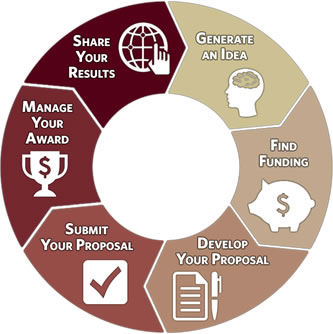The Grant Life Cycle provides an overview of the entire research proposal submission and administration process. The Life Cycle helps you to understand research policies and procedures and walks you through the challenges of finding funding and applying for and administering grants.
Click the area on the image below which represents the stage you would like to learn more about.
Step 1:
Generate an Idea
As you begin to conceptualize your research or creative project, there are several tools that can provide assistance to you. Do you need to locate collaborators? Pivot is one of FSU’s primary resources for identifying funding in any discipline and also contains faculty profiles-both at FSU and at other research institutions- to help identify collaborators. FEAS, the internal Faculty Expertise and Advancement System, also offers a faculty expertise search function. Do you need to meet with a program officer to discuss your ideas? Funding for travel to meet with a program officer in person can be supported by a Funding Agency Travel award, which is available through the Council on Research and Creativity. Additionally, The Office of the Provost offers a travel grant for conference attendance.
Step 2:
Find Funding
There are a variety of funding resources available to FSU faculty. The Council on Research and Creativity (CRC) offers eight internal funding programs. The Research Development (RD) team provides access to Pivot, a searchable funding database that includes over 28,000 opportunities. You can find both private and public funding opportunities through the Pivot database. Looking for private foundation funding? The FSU Foundation provides access to the Foundation Center Online. They can also assist with managing gifts coming into the university. The Office of Faculty Development and Advancement assists with fellowships and award nominations. ORD also provides assistance to faculty with Pivot training. Contact the ORD Office to set up your training today.
Step 3:
Develop Your Proposal
Before you begin writing your narrative, you may want to find some examples of successfully funded proposals, particularly for the grant you are applying to. The Research Development (RD) team provides FSU faculty access to a database of successful proposals. Your departmental grants analyst can assist with budgeting, or either the departmental liaison in either Sponsored Research Administration (for government funding) or the FSU Research Foundation (for private/non-profit) can advise. The ORD offers a curated library of grant writing articles and books, as well as access to Research Development & Grant Writing News. Regarding compliance issues,the Office of Compliance has a website that serves as a portal for the different compliance issues you may have. ORD staff can review your narrative from a non-specialist perspective, and can identify and ask other faculty members with relevant field or funding agency experience for additional reviews. The Office of Faculty Development and Advancement can review fellowship or award applications as well as find references or referees. Finally, if the grant you are applying for is a limited submission proposal, make sure to check the Limited Submission website to find the internal deadline.
Step 4:
Submit Your Proposal
Make friends with your departmental grants analyst early on, and learn how they can help you and what you need to do independently. If you are submitting a proposal to a public funding agency (NSF, NIH, DOD, etc.), you will work through Sponsored Research Administration (SRA), located in the Student Services Building. If you are submitting a proposal to a private funding agency (Gates Foundation, Google, SunTrust, etc.) that has a deliverable (such as a report or product), you will work through the Research Foundation. Be cognizant of the three day rule, and know that you can send your proposal components piecemeal for early review!
Step 5:
Manage Your Award
As you move to the management of your award, you will be working with SRA Post Award staff for government awards and the Research Foundation for private awards. While managing your award, make sure to refer to the Compliance website. You can find information and contacts at the Human Subjects Committee (IRB), Animal Care and Use Committee and Environmental Health and Safety pages. Regarding tuition waivers for your students, contact James Beck at the Graduate School. If you need to find participants for your research, contact Kathleen Haughney to have the opportunity advertised on the Office of Research Research and Creative Activity page. When you are ready to close out your award, please refer to the Close Out Awards & Subawards Page on the SRA site.
Step 6:
Share Your Results
Are you pursuing a patents or special licensing? The Office of Commercialization can help you with these and other Intellectual Property questions.
Need to share your results? You can put all your published work on Diginole (e.g. conference proceedings, journal articles, book chapters, data, technical reports, and white papers). The Office of Research Communication staff can also help publicize your findings.


